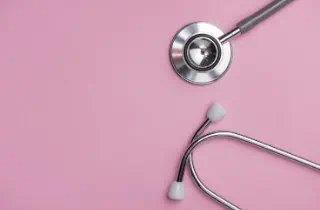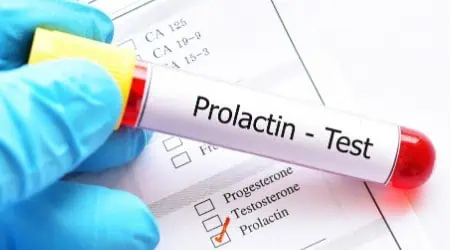
Symptoms of high prolactin (hyperprolactinemia) include irregular periods or no periods, premenstrual mood symptoms, loss of libido, headaches, breast pain, vaginal dryness, acne, and hirsutism or facial hair.
High prolactin is one of several causes of androgen excess and can be mistaken for polycystic ovary syndrome or PCOS. High prolactin may also play a role in pelvic pain and endometriosis.
How to diagnose high prolactin
Normal prolactin in a non-lactating woman is less than 500 mIU/L (23 ng/mL). Optimal prolactin is less than 300 mIU/L (14 ng/mL).

If you get a high prolactin result, consider whether it could be temporarily or falsely elevated due to stress, exercise, or eating. To be accurate, prolactin should be tested under the following conditions:
- early in the follicular phase of the menstrual cycle
- between 8 a.m. and 12 p.m.
- fasting
- hydrated
- not directly after exercise or sex
- relaxed, and
- not on hormonal birth control.
If your prolactin is elevated on at least two occasions, the next step is to identify the underlying cause with the help of your doctor. Common causes include:
- prolactinoma, which is a benign pituitary tumour
- high estrogen, either endogenous or from the pill
- medications such as SSRI antidepressants, anti-psychotics, and stomach acid medication
- underactive thyroid or hypothyroidism
- undereating, including anorexia nervosa
- alcohol, and
- stress.
With strongly elevated prolactin due to a prolactinoma, the best treatment is probably the medication cabergoline.
For other causes, the best treatment is to try to correct the underlying problem, such as taking thyroid hormone to correct hypothyroidism or finding an alternative to stomach acid medication.
For mildly elevated prolactin in the range of 300 mIU/L to 500 mIU/L, consider the following natural treatments, including Vitex.
👉🏽 Tip: Because Vitex can mask the symptoms of a prolactinoma, check with your doctor before trying natural treatment.
Natural treatments to lower prolactin
- Reduce alcohol, especially beer, because hops stimulate prolactin. That’s why beer was traditionally prescribed to increase milk supply. Do not exceed four alcoholic drinks per week.
- Address any underlying issue with thyroid or undereating.
- Reduce stress with yoga, meditation, and long, slow walks.
- Consider taking vitamin B6, which lowers prolactin levels by increasing dopamine.
- Consider taking the herbal medicine Vitex agnus-castus (chaste tree or chaste berry), which lowers prolactin. The exact dose depends on the formulation of the product. Read The dos and don’ts of vitex for period problems.
Ask me in the comments.
